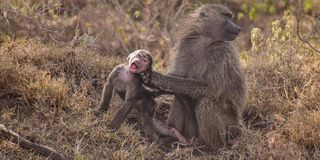Explainer: Increased park fees: Here's why KWS says it's necessary

Cheeky baboon photo taken by Ben Omwaka in Lake Nakuru National Park.
This week, the Kenya Wildlife Service (KWS) announced plans to increase entry fees to national parks, prompting a strong online response. In Nakuru County, Lake Nakuru National Park, one of the country's most popular parks, will see the price of entry for local adults rise by 74% from Sh860 to Sh1,500. For foreign adult visitors, the price will increase by 50% from USD 60 to USD 90.
Many Kenyans took to social media to express their frustration, with some calling the new charges 'exorbitant'. Others have linked the announcement to ongoing issues at the park, including the controversial disappearance of Brian Odhiambo, who was last seen with rangers earlier this year.
For many residents, the fee increase feels like another barrier to accessing public heritage sites. Some have joked that they may as well stick to watching wildlife documentaries on TV.
According to KWS, park fees were last reviewed 18 years ago. Officials argue that the new rates are necessary to fund critical conservation work, improve park facilities and address challenges such as human–wildlife conflict.
David Mwangi, Chair of the Nakuru County Tourism Association, says the increase had been discussed at public participation forums.
“The KWS have repeatedly said that they lack the resources to run their operations. If these additional funds help to resolve human–wildlife conflict, improve accessibility and strengthen community projects, then this is a step in the right direction," Mr Mwangi told Mtaa Wangu.
The changes are anchored in the Wildlife Conservation and Management Act, Cap. 376, which gives the KWS the mandate to adjust fees in line with conservation and sustainability goals.
KWS says that, beyond raising revenue, the new fees are intended to support the growth of wildlife populations, promote coexistence between communities and wildlife, enhance ecosystem resilience and biodiversity, strengthen community participation in conservation, improve benefit-sharing and grow the wildlife economy, and build a more efficient and sustainable conservation agency.
For KWS, the fee increase is about ensuring the long-term success of conservation efforts. However, many Kenyans are asking: Will the higher fees actually translate into better services, stronger conservation and improved accountability?
As the debate continues, one thing is clear: how KWS manages the additional revenue will determine whether the public views this change as a burden or a necessary investment in Kenya’s natural heritage.


